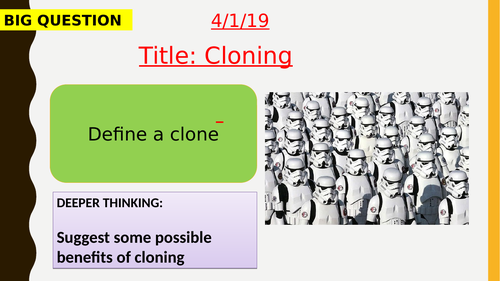


Cloning lesson created in accordance to the NEW AQA Specification (9-1). Designed for higher ability separates class, although content can be adjusted to suit any ability. Includes: questions, slide timers, slide animations, interactive answers on slides, worksheet and a plenary. *This lesson includes a practical which is not required. *
NB: This lesson is for SEPARATE science ONLY
AQA spec link: 4.6.2.5
Relevant chapter: B14 Variation and evolution. AQA Biology third edition textbook-Page 226-227.
Students are required to know the following;
Tissue culture: using small groups of cells from part of a plant to grow identical new plants. This is important for preserving rare plant species or commercially in nurseries. Cuttings: an older, but simple, method used by gardeners to produce many identical new plants from a parent plant. Embryo transplants: splitting apart cells from a developing animal embryo before they become specialised, then transplanting the identical embryos into host mothers.
WS 1.3, 1.4 Explain the potential benefits and risks of cloning in agriculture and in medicine and that some people have ethical objections. There are links with this content to Advantages and disadvantages of sexual and asexual reproduction (biology only) and Selective breeding.
Get this resource as part of a bundle and save up to 23%
A bundle is a package of resources grouped together to teach a particular topic, or a series of lessons, in one place.
AQA Biology-SEPARATE topics PAPER 2 ONLY
Separate Sciences B10.4, B10.5 & B10.6 B11.9 & B11.10 B12.1, B12.2, B12.3, B12.4. B12.5 B13.4, B13.5 & B13.6 B14.5 & B14.6 B15.1, B15,2, B15.3 & B15.4
AQA new specification-B14 Variation and evolution-Separate science bundle
This bundle contains the content for SEPARATE/BIOLOGY ONLY students. It includes the B14 unit-Variation and evolution. All lessons have been done in accordance to the specification requirements and have been pitched to a higher ability class. Videos have been embedded for ease of use, and printer friendly resources attached. Search the individual lessons for more information on the lesson content. Save 10% by purchasing this bundle :) Total = 7 lessons Lesson 1-Variation Lesson 2-Evolution by natural selection Lesson 3-Selective breeding Lesson 4-Genetic engineering Lesson 5-Cloning Lesson 6-Adult cell cloning Lesson 7-Ethics of genetic technologies Good luck with your lessons :)
Something went wrong, please try again later.
This resource hasn't been reviewed yet
To ensure quality for our reviews, only customers who have purchased this resource can review it
Report this resourceto let us know if it violates our terms and conditions.
Our customer service team will review your report and will be in touch.
